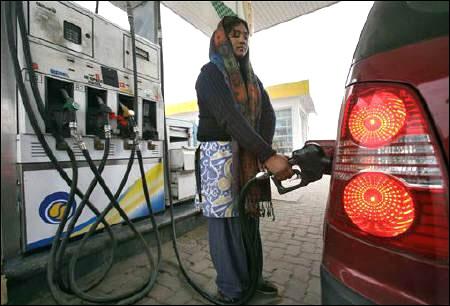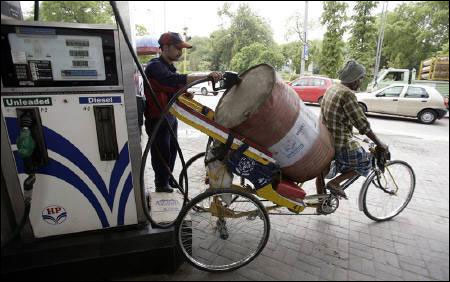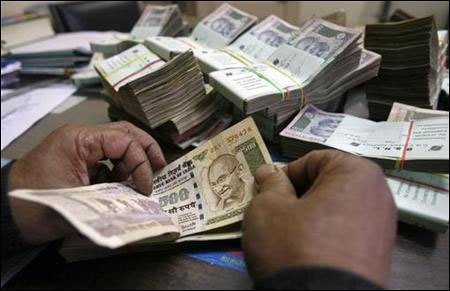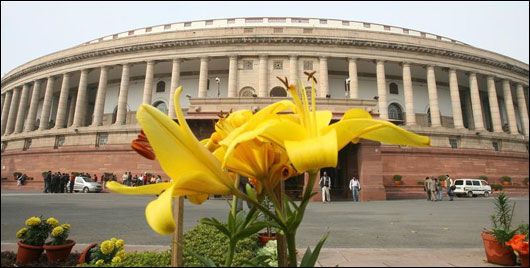Photographs: Mukesh Gupta/Reuters Business Standard
Petroleum Minister Jaipal Reddy, speaking after a ministerial-level meeting on inflation on Monday, said that the government had no immediate plans to raise the administered prices of diesel, kerosene and domestic LPG (liquefied petroleum gas).
This comes after oil marketing companies raised the price of petrol last week by Rs 7.50 per litre, an increase of 12 per cent.
Mr Reddy's statement was firm: he said a price hike was 'out of the question'.
This is a problematic point of view.
As other members of the government have pointed out -- Rural Development Minister Jairam Ramesh and Chief Economic Advisor Kaushik Basu among them -- India cannot afford to delay increasing prices, given the ballooning subsidy bill.
. . .
Why govt can't delay raising diesel, LPG prices
Photographs: Mukesh Gupta/Reuters
According to the Revised Estimates presented with this year's Budget, subsidies on diesel, kerosene and LPG in 2011-12 reached Rs 68,500 crore (Rs 685 billion), 23 per cent of the total subsidy bill.
The Budget Estimates for 2012-13 suppose that that amount will decrease sharply, to Rs 43,580 crore (Rs 435.8 billion).
Given that oil prices have shown no dramatic fall, there is no alternative but to raise the prices faced by consumers.
It is instructive to look at the under-recoveries on diesel, kerosene and LPG over the past year.
The total amount was Rs 1,38,541 crore (Rs 1,385.41 billion), coming to Rs 11,545 crore (Rs 115.45 billion) a month.
. . .
Why govt can't delay raising diesel, LPG prices
Photographs: Jayanta Dey/Reuters
The Budget was presented in the middle of March; it is now the end of May.
Presuming last year's price-cost ratio continues, in about two months, the total amount budgeted for fuel subsidies for this entire year will be more than the oil marketing companies' under-recoveries for the financial year to date!
Clearly, delay is simply not an option. What of Mr Reddy's concern for the inflationary effects of an increase in administered prices?
The Reserve Bank of India had pointed out in its annual review of monetary policy last month that while a hike could adversely impact headline inflation -- as diesel, kerosene and LPG are together over six per cent of the wholesale price index, while petrol is only one per cent -- it would not result in generalised inflation, as companies' pricing power was currently low.
. . .
Why govt can't delay raising diesel, LPG prices
Photographs: Reuters
It will, thus, have a one-time effect on inflation, increasing it sharply; but the impact on the fiscal deficit, and thus on inflation over a longer horizon, will be permanent.
In addition, it will clear the decks for the RBI to look again at interest rates, to aid investment and growth.
Inflation, thus, cannot be an excuse.
Most importantly, it is necessary for the government to clearly articulate that rationalisation of administered prices is overdue.
LPG cylinders, used primarily by the middle class, are heavily subsidised, and the system is badly structured and full of leaks.
. . .
Why govt can't delay raising diesel, LPG prices
Photographs: Reuters
The price differential between diesel and petrol has grown so vast -- in Mumbai, a litre of diesel costs just 57 per cent of what a litre of petrol does -- that car buyers are switching to diesel cars in large numbers. In fact, there are waiting lists for them, and not for petrol cars.
An ever-larger proportion of the fuel subsidy, thus, is going to the middle class and not its intended recipients.
Yet the opportunity costs of this government subsidy are borne overwhelmingly by the poor.
The government cannot postpone reform much further.







article